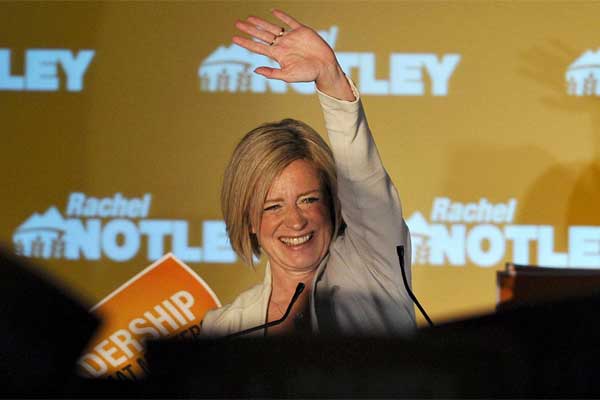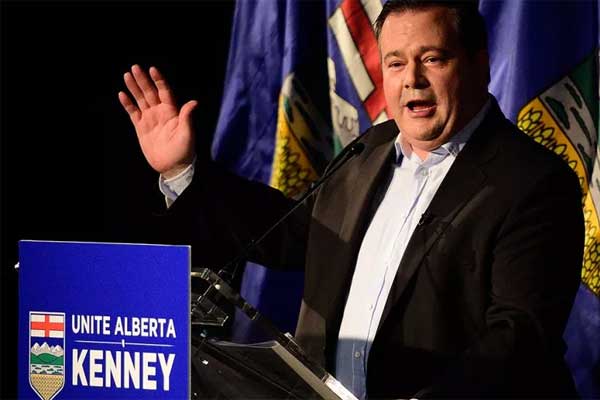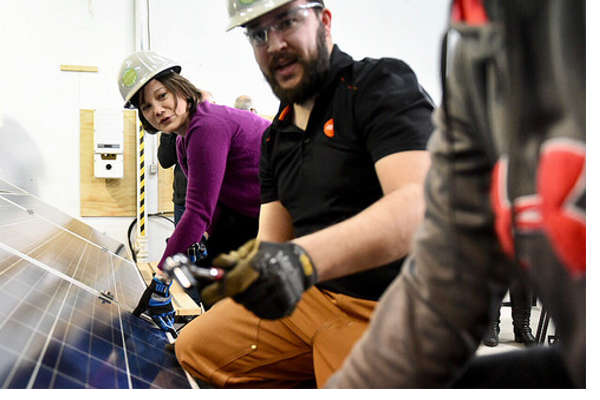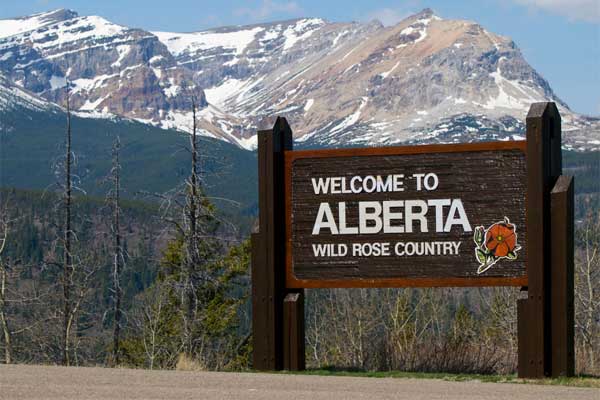Since 2015, Alberta’s been the hottest place in Canada to invest in solar energy. This is evident when looking at the growth projections, which show that since 2015, the renewable energy industry has exploded with a 500 percent growth.
The rapid growth of the solar industry can largely be credited to Rachel Notley’s NDP, who was swept into power with a majority government back in 2015. Since the election, the NDP has introduced a number of programs aimed at boosting the demand for renewable energy throughout the Province.
Energy Efficiency Alberta, an initiative funded by the NDP’s provincial carbon tax, is one of many programs offering Albertans increased opportunities to make the switch to solar energy. The primary incentives provide rebates for residential, commercial and non-profit solar installations.

Alberta NDP Leader Rachel Notley is shown on election night 2015. (Dan Riedlhuber/Reuters)
The NDP’s time in power has certainly bolstered the growth of the industry; however, with this year’s volatile elections, it’s uncertain whether or not the NDP will remain in power.
The frontrunner for replacing Notley is Jason Kenney, leader of the United Conservative Party. Parallels are often drawn between Jason Kenney and Ontario’s Doug Ford, both of whom are unapologetically conservative, and ideologically driven.
For the solar industry in Alberta, the most troubling similarity between the two leaders is their anti-renewable energy sentiment.
When Doug Ford came into power in 2018, he immediately began unraveling the former government’s progress on developing a strong renewable energy market in Ontario. Ford’s cancellation of 758 long term renewable energy contracts, electric vehicle (EV) rebates, the green energy act, cap and trade, and vehicle emission standards demonstrated his government’s apathy towards assisting the development of green industry.
The implemented cuts resulted in a dramatic weakening of the market, especially for electric vehicles. Soon after the cuts were announced, Tesla sued Ontario’s government and won, forcing Ford’s conservatives to do a U-turn on the scrapping of EV rebates.
Now enters Jason Kenney, a good friend of Ford whose energy and the environmental platform is eerily similar. Some of the main platforms points Kenney has been campaigning on include the scrapping of the carbon tax and all carbon tax-funded projects, cutting so-called “red tape” regulation, and letting renewable energy compete in the market without any subsidies.
While Kenney has indicated he intends to follow through with “good faith” renewable energy contracts, there has been no specification towards what constitutes “good faith.” This purposeful lack of a definition leaves the door open for a potential Kenney government to wreak havoc on Alberta’s long-term renewable energy contracts, much as Ford did at the beginning of his term.

Jason Kenney raked in cash in his run for the Progressive Conservative leadership, but he’s also reaping criticism for his campaign’s financial practices (CalcaryHerald)
Kenney has vowed not to repeat the “mistakes” of Ontario’s government under Kathleen Wynne, which provided renewable energy producers a guaranteed rate far surpassing that of the market. Alberta however, uses an auction system as a way of awarding contracts to renewable energy producers. This has allowed for significant growth in the industry, without being forced to offer absurdly high subsidies as incentives for companies to produce.
By engaging renewable energy producers in a competitive auctioning process that promises low rates, but long-term contracts, Rachel Notley has managed to secure Alberta the lowest rates in Canada for renewable energy.
Early in 2019, Notley’s NDP signed a 20-year contract with Canadian Solar Solutions to develop 100 megawatts of power in Southern Alberta. The cost is a mere 4.8 cents per kilowatt-hour, even lower than the market rate for natural gas, which (before factoring in the carbon tax) sits at 5.4 cents per kilowatt-hour. The total savings for the Albertan government total of 3.9 million dollars annually.
The importance of these long-term contracts cannot be understated, as they allow for the fostering of a stable market environment, one that’s ripe for investors. The high upfront capital cost of green energy projects has long hindered the ability of renewable energy to compete with fossil fuels.

Minister Shannon Phillips helps install solar panels at Gridworks Solar Energy Training Centre. Credit: Alberta Government
However, Alberta’s bidding process has allowed for renewable energy to demonstrate that it’s the socially, environmentally and economically responsible type of energy to pursue. Competitive auctioning has allowed Alberta to transform into what Ontario used to be: the renewable energy epicenter of Canada.
If Jason Kenney forms government, his unwavering commitment to force renewable energy to compete solely at the market level by eliminating subsidies may end up proving counterproductive. Generous subsidies are what have promoted the rapid fall in costs associated with renewable energy. It’s the significant drop in production costs that have allowed for companies to offer extremely low prices per kilowatt when bidding on long term contracts.
Kenney has emphasized that cutting subsidies is another way of restoring fiscal responsibility to Alberta, however, it has the potential to cool down a market which is currently on fire.
Whether or not Jason Kenney wins this year’s Provincial election, Alberta will have a bright future in renewable energy. The efforts of Rachel Notley’s government to stimulate the solar industry and diversify Alberta’s economy have undoubtedly paid off.
Diversification through renewable energy offers Alberta the unique opportunity of distancing itself from its boom and bust past. Kenney has the potential to slow down the renewable energy market, but as the production costs continue to fall, it’s emerging as the obvious energy choice.
The key policy to watch if Kenney is elected is whether he would respect long term renewable energy contracts. If not, his message of Alberta being “open for business” will be nothing more than a campaign slogan, adding one more parallel between himself and Doug Ford.











Comments